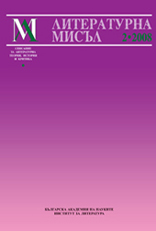Старите и модерните: един идентичностен хоризонт
The Ancients and the Moderns: an Identity Horizon
Author(s): Stoyan AtanassovSubject(s): Cultural history
Published by: Институт за литература - БАН
Keywords: Ancients and the Moderns
Summary/Abstract: The antonymic pair ancient-modern is a lasting form of self-consciousness systematically used in the Western European tradition. This history is long: it stems from the beginning of the late Antiquity, takes shape during the early Middle Ages, continue through all major periods, and leaves an imprint even today. Although the West has resorted to it for more than fifteen centuries, its usage follows relatively limited paths. They never reach Eastern Europe, particularly Bulgaria, whose social and cultural identity has always relied on spatial rather than temporal models: Byzantium, Turkey, Soviet Russia, the West... How to explain then our preference for a certain "somewhere" instead of some kind of “before”? The answer could be the assumption that the identity development of Bulgarian society does not take the shape of a dialogue with its own past. It is rather part of the logic of catching up with historical time, in other words, in a process of modernization, which presupposes striving to perceive a certain cultural or social matrix existing somewhere else now, i.e. not existing here, in our country. In this sense the identity process in Bulgaria could be considered the result of a given political will, while the dichotomy ancient-modern in the Western tradition is, in its nature, a cultural phenomenon.
Journal: Литературна мисъл
- Issue Year: 2008
- Issue No: 2
- Page Range: 59-71
- Page Count: 12
- Language: Bulgarian
- Content File-PDF

